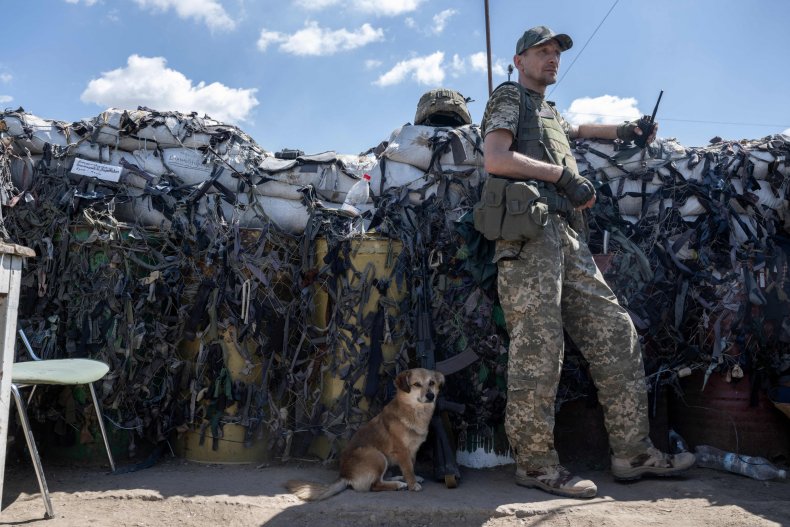Table of Contents
[ad_1]
Locked in ferocious artillery battles against Russian forces superior in numbers and armaments, soldiers fighting with Ukrainian forces and experts both told Newsweek that the men on the front lines are not getting the equipment and supplies they desperately need.
While big-ticket Western weaponry such as HIMARS multiple launch rocket systems and M777 artillery pieces have made headlines in recent days after hitting several Russian ammunition depots and command centers, more basic kit is being diverted away from its intended recipients in the direct line of Russian fire.
“There’s a huge shortage of armored vehicles on the front,” Danil, a Spanish volunteer fighting with the Ukrainian forces, told Newsweek. “But when an English volunteer tried to send 27 of them into the country, they got held up at customs. He came to Ukraine to train the troops on how to use them, and when he got here, he couldn’t do anything, because the Ukrainian government wouldn’t let the trucks through.”
“We can’t wait on bureaucracy,” he added. “We need those vehicles. People are
dying because we don’t have those vehicles.”

Photo by BULENT KILIC/AFP via Getty Images
While Ukrainian soldiers were reluctant to speak on the record, many of them have complained privately about the Ukrainian military’s failure to maximize the effectiveness of the resources available to it. Foreign fighters like Danil and Michael, a U.S. military veteran, felt less constrained than their Ukrainian brothers-in-arms to speak out about supply problems that often become a matter of life and death.
Michael told Newsweek of the frustration that comes with being under-equipped for battle.
“They called the Westerners here to fight, but all they’ve got us doing is setting up OPs [overwatch positions],” he said. “We were watching the Russians right across the river, and our job was to observe, report, and harass. Harass if we could, because when one of their troop transports would drive past within range, we couldn’t do anything to hit it.”
Michael blamed the problem on supply chain issues.
“Yeah, we had Javelins [American-supplied anti-vehicle rockets] sitting in the basement back at base,” he said. “But we didn’t have any batteries to power up the computer. Those weapons could have reached the Russian vehicles no problem, but without the computer, they’re worthless.”
While Ukraine’s effective use of more sophisticated, Western-supplied weapons systems continues to attract most of the Western media attention, troops on the front remain in dire need of basic necessities.
“When the Russians were pushing forward in the East,” Michael said, “part of the reason was their artillery advantage, but part of it was just the fact that we couldn’t get our hands on gear like night vision goggles, rangefinder binoculars, printers for making paper maps, and f*****g batteries, you know?”
“It’s rookie,” he said.
Shortcomings in the Ukrainian military’s system of supply and distribution are nothing new.
Blue/Yellow, a Lithuanian NGO headed by Jonas Oehman, a Swedish filmmaker, operates a distribution network in Ukraine that allows Ukrainian fighting units to make direct requests for military items ranging from commercial drones to encrypted communications equipment.
Oehman has been coordinating shipments of non-lethal military aid directly to Ukrainian units on the frontlines since 2014, when Russian troops invaded and occupied the Crimean peninsula and launched a war in the Ukrainian Donbas region.
“We have good relationships with the government in Kyiv, but the supply and distribution to the Ukrainian armed forces is, at best, uncertain,” Oehman told Newsweek. ” If we went through the central, official channels, I am concerned that much of what we send wouldn’t be delivered as fast and, most importantly, as accurately.”
Despite repeated declarations that corruption is being addressed, with notable results in some areas, successive Ukrainian governments have failed to transform the Ukrainian military into the kind of institution that Western partners can fully trust.
“Unfortunately, bureaucracy, kleptocracy, and sometimes just sheer chaos, do not allow you to do everything by the book,” Oehman said. “To make a difference, I advise the West to do as we do — work directly with the guys doing the fighting — work with the units.”
Retired U.S. Navy Captain Yuri Tabach tells a similar story. He is the first Soviet-born commissioned officer in the U.S. armed forces and the former chief of staff of the special military mission of NATO and its representative in the Russian Federation. Since the start of Russia’s full-scale invasion of Ukraine on February 24, Tabach has made several trips to the front lines in order to deliver any useful supplies that volunteers are able to ship across the border.
“Very often, the guys doing the fighting in the East are outfitted in gear that’s inferior to what soldiers way out in the West of the country are walking around in,” Tabach told Newsweek.
However, he attributes the problem not to corruption, but rather to simple supply-chain mismanagement.
“When gear crosses the Polish border, the first units that get the chance to go through the shipment are the ones that are right there on the ground where it’s coming in,” Tabach said. “As in any military, commanders do what they can to get the best stuff for their guys, and commanders in western Ukraine are no different.”
In his view, it’s an organizational problem in the Ukraine military that needs to be addressed.
“It isn’t that kit like boots and night-vision goggles are getting stolen and sold on the black market,” Tabach said. “It’s that favoritism and bureaucratic inefficiency allows for a lot of stuff that’s needed on the front to be siphoned off to units who can definitely use everything they’re getting, but who maybe don’t have the greatest need for what they’re getting.”
While politicians like Republican Congresswoman Victoria Spartz of Indiana have called for heightened oversight of aid shipments to Ukraine, and media outlets like the U.K.’s Financial Times have speculated about the possibility of weapons sent to Ukraine ending up on the European black market, Tabach considers such alarmism to be counterproductive.
“It’s impossible to steal a HIMARS system and sell it on the black market,” he said.
“I know how the U.S. military tracks these things, and it’s just flat-out impossible.”
Tabach offered a simple solution to the problem.
“You’re never going to create a perfect bureaucracy,” he said, “and so the best way to ensure that the guys on the front are getting the stuff that they need is to increase the supply so much that there’s still enough left over by the time the shipment arrives in the East.”
Anton Gerashchenko, a former Ukrainian MP and current advisor to the Ministry of Internal Affairs, concurred with Tabach’s assessment.
“First of all, it must be stated that any rumors about Ukrainian weapons being sold on the European black market are products of Russian propaganda,” Gerashchenko said. “If such an incident did occur, the guilty party would not even have time to be prosecuted before his fellow soldiers tore him limb from limb.”
He said that many of the problems stemmed from the sudden onset of the Russian invasion.
“This war, like any large war, is one which no one could have been completely prepared for,” Gerashchenko said. “When it started, Ukraine had an insufficient supply of certain necessary items. In instances where the unit commander was more, shall we say, pushy, his unit would be better equipped than others.”
He said that while the Ukrainian military has devoted the bulk of its attention to solving larger problems, Ukrainian civil society has begun to fill the supply gap.
“In many cases, volunteers from civil society provide for soldiers the kinds of little things that the military itself cannot,” Gerashchenko said. “As an example, I and my comrades helped purchase 2,000 shovels, which we distributed to units around Kramatorsk and Lysychansk,”
“Just as in the Second World War,” he added, “A shovel is still a soldier’s best friend.”
Sergey Krivonos, a notably active retired general known as the father of Ukraine’s special forces, had similar praise for the efforts of civil society in supporting the war effort.
“If it weren’t for the help of the volunteers, our soldiers would go cold and hungry,” Krivonos said. “For eight years this army was at war, and it still did not figure out how to supply itself. It’s only thanks to the work of the volunteers that the Ukrainian military was able to resist the Russian invasion as successfully as it did.”
The general also offered some candid advice to any American legislator who might feel leery about interfering in Ukraine’s domestic affairs.
“One American senator asked me how he could help Ukraine,” Krivonos said. I told him, ‘Don’t be shy about telling the truth and demanding that our political leaders meet your demands.’ If they are doing something bad, you must say, ‘that is bad.’ If someone needs to be fired, you must say, ‘fire him.’ Only then will there be order.”
While Western governments have publicized providing advanced multiple launch rocket systems and precision-guided artillery shells to Ukraine, clear figures on the type and amount of smaller-ticket items are harder to come by. The Ukrainian Ministry of Defense does not disclose data on what it has in storage, and U.S. government press releases rarely contain precise figures on items such as night vision goggles and communications equipment.
On July 8, the Pentagon released a fact sheet outlining its deliveries to Ukraine to date. While the quantity of kit is impressive, it is not clear that it is sufficient. The list included:
● Hundreds of Armored High Mobility Multipurpose Wheeled Vehicles
● Over 10,000 grenade launchers and small arms
● Tactical secure communications systems
●Thousands of night vision devices, thermal imagery systems, optics, and laser rangefinders
Absent a more detailed accounting, it is impossible to determine whether Ukrainian frontline soldiers’ complaints are the result of a distribution problem in Kyiv, or of shortfalls in supply by Ukraine’s Western partners, or even simply instances of classic soldiers’ griping.
While it is true that there have been credible reports of small-ticket military items finding their way onto the black market, it does not appear that vast quantities of Western aid have been resold for profit after reaching Ukraine. Foreign fighters Michael and Danil spoke of instances in which Ukrainian civilians attempted to sell them small arms, ranging from hand grenades to Glock pistols. While such instances are frustrating, the impact on Ukraine’s overall war effort would seem to be negligible.
But it clearly is a source of irritation and resentment for the fighting forces.
“These guys should be giving us this stuff so that we can use it to defend their country,” Danil said. “Instead, you have some local people who are trying to make money on the volunteers coming here to fight for Ukraine’s freedom.”
Despite the disappointments, both Michael and Danil remain committed to the Ukrainian war effort.
“It’s not what we thought it would be like when we came over,” Michael said, “but I always remember why I’m here. I’ll give you an example.
“I was in Lviv training their Territorial Defense battalions,” he said. “There was this lady, this innocent person who had never held an AK [AK-47] in her life, just trying to walk and hold the gun at the same time. The gun was almost bigger than her body. She was so sweet. She shouldn’t have to do that.”
“I came here to make sure that she never has to use it,” he added.
Danil said that, for him, it’s all about the Ukrainian people.
“We’re here because we want Ukraine to win,” he said. “I love the Ukrainians soldiers’ spirit. Even when they can’t get the resources they need, even despite the corruption higher up, they still keep fighting. They just won’t break. That’s why I like fighting with them.”
[ad_2]
Source link







